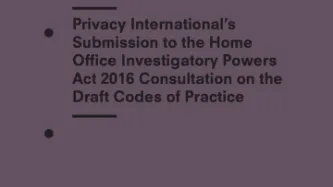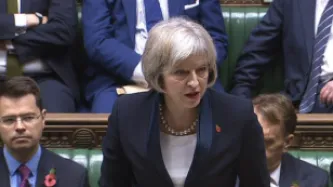Search
Content type: Advocacy
BackgroundThe Snowden revelations and subsequent litigation have repeatedly identified unlawful state surveillance by UK agencies. In response, the UK Parliament passed the highly controversial Investigatory Powers Act 2016 (IPA), which authorised massive, suspicionless surveillance on a scale never seen before, with insufficient safeguards or independent oversight.Privacy International led legal challenges to this mass surveillance regime both before and after the Act became law. The Act…
Content type: News & Analysis
It's a big question, have you purchased a card for your local surveillance camera on Surveillance Camera Day?
Yes, Surveillance Camera Day is a real thing and happens on 20 June.
Perhaps your local community could create a bingo card to see who knows where all the local cameras are. Are there any on your local bins, how about the lampposts or a billboard?
Have you had a facial recognition van in your local community? Did you see the police helicopter crew video camera…
Content type: Press release
Privacy International and Open Rights Group have submitted a response to the Consultation on establishing a UK Privacy and Civil Liberties Board.
Content type: Advocacy
The powers set out in the Investigatory Powers Act are wide ranging, opaque and lacking in adequate safeguards. The Government have now published updated Draft Codes of Practice for certain parts of the Act. Unfortunately, the Codes do little to solve the Act’s problems. Instead, they add little transparency, occasionally expand powers, and undermine some of the limited safeguards in the Investigatory Powers Act. These Codes demand close scrutiny. The unusually short timeframe for…
Content type: Press release
Today’s report by the Joint Committee on the Investigatory Powers Bill is the third committee report that concludes that the Home Office has failed to provide a coherent surveillance framework.
The Joint Committee on the Investigatory Powers Bill today published a 198 page report following a short consultation period between November and January. Their key findings are that:
- the definitions in the bill need much work, including a meaningful and comprehensible…
Content type: News & Analysis
Despite Wednesday's publication of the Investigatory Powers Bill being trailed as world leading legislation that would balance security and privacy, what the Government is actually seeking is a mandate for mass surveillance. This is a new Snoopers' Charter and we must oppose many of its most virulent elements.
The true debate on surveillance can now begin. After years of downplaying, obscuring, and denying the Snowden revelations, the Government has finally joined the conversation about the…
Content type: News & Analysis
While the initial disclosures by Edward Snowden revealed how US authorities are conducting mass surveillance on the world's communications, further reporting by the Guardian newspaper uncovered that UK intelligence services were just as involved in this global spying apparatus. Faced with the prospect of further public scrutiny and accountability, the UK Government gave the Guardian newspaper an ultimatum: hand over the classified documents or destroy them.
The Guardian decided that having the…
Content type: Press release
Privacy International today filed a legal complaint demanding an end to the unlawful hacking being carried out by GCHQ which, in partnership with the NSA, is infecting potentially millions of computer and mobile devices around the world with malicious software that gives them the ability to sweep up reams of content, switch on users' microphones or cameras, listen to their phone calls and track their locations.
The complaint, filed in the UK’s Investigatory Powers Tribunal, is the…
Content type: Press release
Civil society organisations today called upon the members of the Human Rights Council to assess whether national surveillance laws and activities are in line with their international human rights obligations.
The Snowden revelations have confirmed that governments worldwide continue to expand their spying capabilities, at home and abroad. Widespread surveillance is being conducted in violation of individuals’ rights to privacy and free expression, and is seldom regulated by strong legal…




